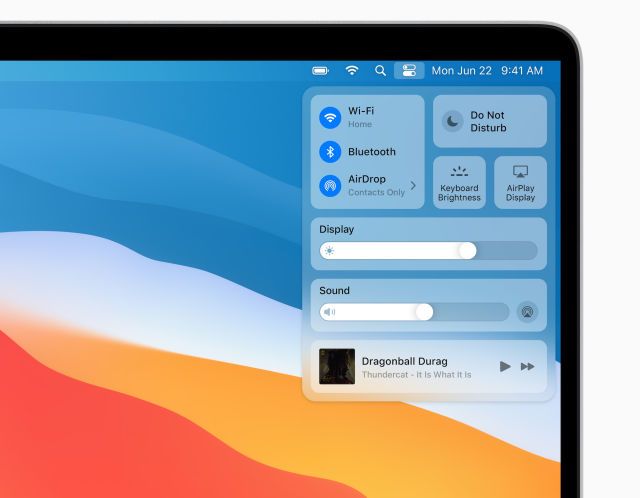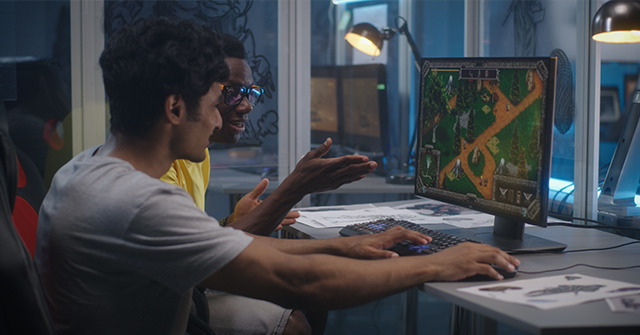I looked at the email in slight disbelief. (In my head it came with an appropriately elaborate font.)
Dear Managing Director David Polfeldt,
Would you be so kind as to give his Royal Majesty a tour of your company?
The King of Sweden? Really?! When did a video game studio become eligible for an official visit from His Royal Highness?
From about 2010 onward, I started to notice a small change in how people outside the game industry perceived it. We were gradually met with more respect, more interest, more fascination, more envy, and it was eventually impossible for the establishment to ignore the fact that every year, Sweden’s largest cultural export product was a video game. If it wasn’t DICE’s Battlefield, it was Starbreeze’s The Darkness or The Chronicles of Riddick, or Avalanche’s Just Cause. Studios would come and go, briefly hitting the top of the international sales charts, and the heritage of success would eventually give birth to international hit games like Candy Crush, Minecraft, the rebirth of the Wolfenstein and Battleground games, and behind them a rich plethora of almost perfectly crafted interactive entertainment products. The masters of cultural export were no longer the musicians behind the Britney Spears singles, the reissues of ABBA albums, or Avicii. Nor were they the children’s books coming from the deep treasure chest of Astrid Lindgren, or the modern wave of Swedish crime novels.
It took some time for this to sink into the common psyche. It was hard for many to suspend their belief that computer games were made just by nerds, for a tiny nerd audience, and that they were not only violent but sexist, and dangerous for the young. Eventually, a few local politicians asked to visit the studio and get a tour. They immediately realized we were creating a lot of jobs, and decided they liked it. They would pass the message upstairs, and soon national politicians and ministers showed up at our doorstep too. Sometimes they were genuinely interested, but other times they just wanted to take a photo to post on social media to appeal to young potential voters.
I became somewhat of a poster boy for the industry, due to my commitment to a few charities and my opinions about the responsibility that falls on the corporate world. I believe that we build society together, whether we’re private companies, government agencies, or nonprofit organizations. If you have power, you have responsibility; it’s as simple as that, and the responsibility grows with your power. Since I managed to voice this opinion while consciously avoiding partisan politics, I was perceived by a growing group of people as a good choice to represent the Swedish game industry. Also, I do enjoy talking and making presentations, so I came with a nice buzz of entertainment value too—like a modern court jester, I suppose. My poster-boy career peaked when I actually had dinner at the Swedish royal castle with the queen herself, but at the time, all I had was an email from a royal staffer, telling us that the king wanted to check us out. Well, I guess that counts as some form of recognition, I decided.
The coolest part of the king’s visit was the preparation by the Secret Service men, who, I realized, had already done a background check on me and decided I was not plotting to kidnap His Majesty.
The bodyguards/ninjas searched the entire Massive office, looking for anything that could threaten the integrity or safety of the visit. Silent, fit men in black suits, all of them tall and blond. Once they were satisfied with the preparations, they took up positions around the expected route of the tour and stood perfectly still, like statues with a bottled-up capacity for instant violence. I wondered if the king had brought an official taster to drink his coffee and check for poison too. What an exciting job! I thought. Eating magnificent food all day, with the added excitement of knowing that every bite might be the very last one.
We made an effort to tidy up our office, but only partially succeeded. Massive, like most game studios, tended to look like a mix between a boring white-collar office and a shy, merchandise-hoarding teenager’s bedroom.
The king arrived with his posse, and we did our usual thing: traditional Swedish cinnamon rolls, coffee (no taster, to my disappointment), and a studio tour. I made a presentation that covered Massive’s history, our games, and our approach to management. I’d done this many times, beginning back in 2008 when Activision broke up with us and we were trying to find a new home for Massive. I had just kept building and improving on that same presentation until it became an intense explosion of thoughts, videos, and narrative twists that would usually knock the audience over. I was very comfortable. Somewhere in the back of my head I knew that regardless of how I was doing, what the Swedish king thought would make absolutely no difference to my reality.
Suddenly he raised his hand like a schoolboy asking for permission to speak. It felt weird nodding in approval to him, but he seemed to be willing to wait with his hand raised forever.
“Yes,” I said. “You.” And I pointed directly at him in a strangely demanding way. Then I remembered my manners and quickly added, “Your Majesty. Yes?” I’d been told not to address the royal presence by his name, Carl Gustaf, or with a common “you.”
“Your Majesty! There seems to be a question?” I added with emphasis.
“I might be stupid, but I wonder something,” he said, in a classic display of the Swedish tradition of downplaying oneself. You gotta be humble in Sweden!
“I don’t really understand why games work so well?” the king continued, his statement taking on the tone of a question.
“Uh. You mean technically?” I asked, a bit confused, expecting to explain relatively basic hardware and software stuff.
“No,” he said. “As a medium. I don’t understand why it is more fun than TV or movies. I see that the audiences for the old entertainment forms are shrinking. The young seem to spend a tremendous amount of time playing games. It makes me wonder. Why?”
Such a great question, I thought, and as my unprepared mind began to actually process it, I realized I had no answer ready, just instincts. And then it all came to me, a whole range of insights that I’d never verbalized before. I thought about how the game medium is the best medium ever created, and that the form will overshadow all old forms of entertainment for very good reasons. I finally understood that the industry was not only moving toward respectability, but was on its way to completely dominating the media landscape, maybe forever.
Is it possible that video games are better, more powerful, and even more democratic than TV, movies, theater, opera, music, radio, literature, or any other kind of classic media? Would it be fair to claim that interactive games are fundamentally more pleasing, rewarding, and healthy too?
Thinking about it further, I realized that if nothing else, games have two major advantages over all classic media: (1) the way games engage with an audience’s senses; and (2) the role of the hero. All old media forms engage an audience through one or two senses, hearing and/or sight. Music reaches us only through hearing, but on the other hand, rhythm and melody seem to touch us biologically in such a way that they really engage the emotions.
Literature relies on sight. Radio relies on hearing. Opera, theater, TV, and movies reach us through both sight and hearing and are incredibly powerful media. The percentage of activated senses is in the range of 20 to 40, not even half of the scale. Games, however, push our percentage activation to 60, because they use sight, hearing, and touch. It sounds banal, but the effect is tremendous.
While the old forms of media are relying on the cerebral, games reach the audience with both the tactile and the cerebral, which totally changes the experience in the brain. What the fingers and hands are doing is directly linked to events and situations in the experience, and even the slightest flick of a finger can have a major and instant impact in the game world. Of course, this requires a completely different level of attention and engagement from the audience. It’s access, it’s being the hand of God, it’s My hands on the steering wheel. The level of direct interaction with the game worlds becomes more and more complex and satisfying for every year that passes, as the medium continues to emerge and to fundamentally reshape the relationship between storyteller and audience.



 Driving the Polestar 2, the first electric car with a brain by GoogleAndrew J. Hawkins, The VergeThe Verge offers some first impressions of the first EV that runs Android Automotive: Google’s tech that controls things like air conditioning, navigatio…
Driving the Polestar 2, the first electric car with a brain by GoogleAndrew J. Hawkins, The VergeThe Verge offers some first impressions of the first EV that runs Android Automotive: Google’s tech that controls things like air conditioning, navigatio…



